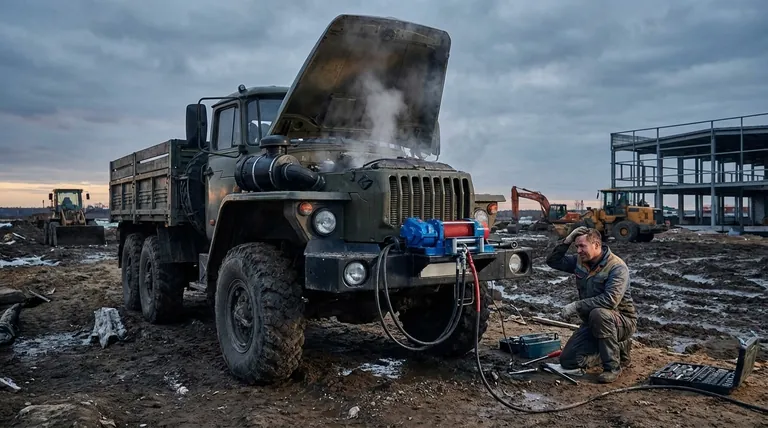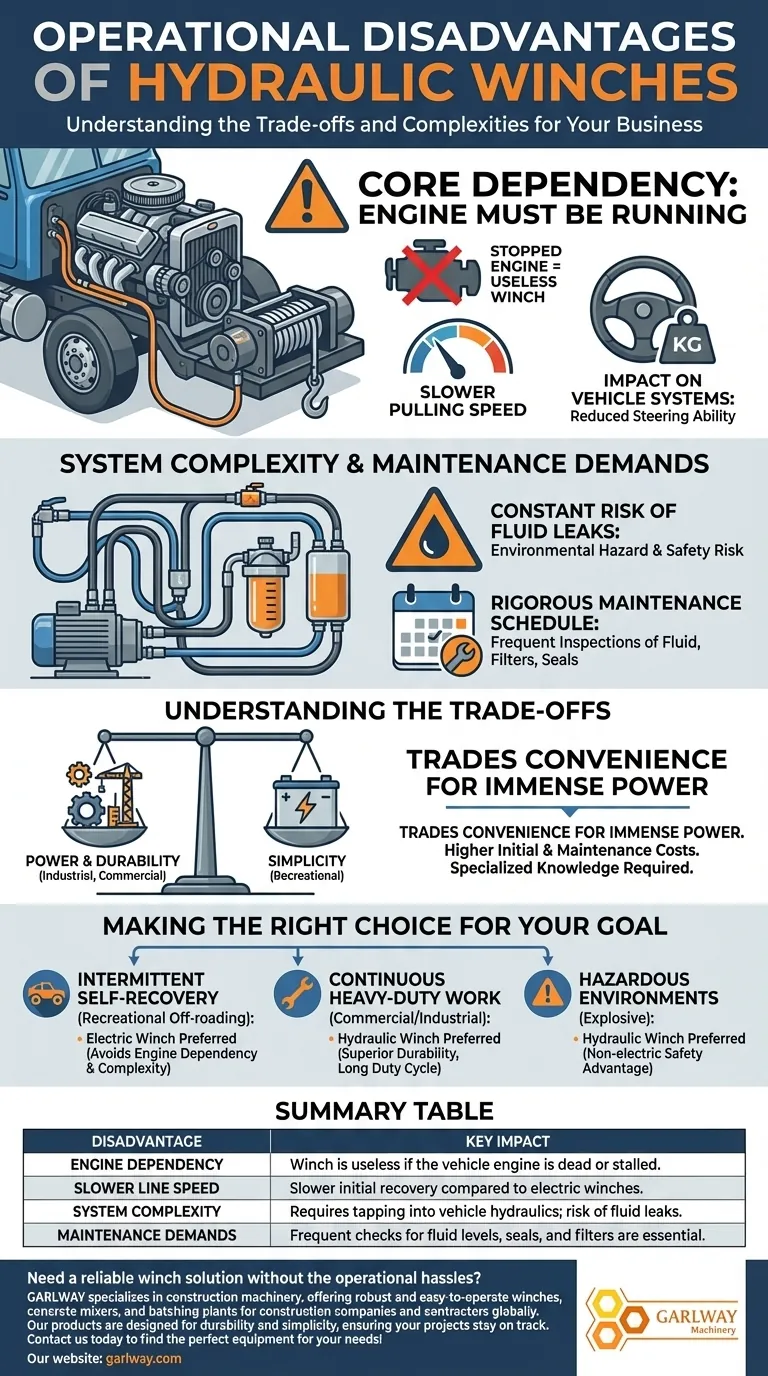The primary operational disadvantage of a hydraulic winch is its absolute dependence on a running vehicle engine. This means if your engine is dead, stalled at an extreme angle, or otherwise inoperable, the winch is useless. This core dependency is coupled with slower operating speeds and a more complex system that requires diligent maintenance to prevent leaks and ensure reliability.
A hydraulic winch trades the simple, self-contained convenience of an electric winch for immense power and durability. This trade-off introduces significant operational complexities, chief among them a total reliance on the vehicle's running engine and hydraulic system.

The Core Operational Dependencies
Understanding how a hydraulic winch integrates with your vehicle is key to grasping its limitations. Unlike an electric winch that just needs a battery, a hydraulic winch becomes another component of your engine system.
The Engine Must Be Running
The hydraulic winch doesn't have its own motor; it uses hydraulic fluid pressurized by a pump. This pump is driven by the vehicle's engine, typically the power steering pump.
If the engine cannot run for any reason—be it mechanical failure, fuel starvation, or the vehicle being on its side—you have no way to power the winch. This is the single most critical point of failure.
Slower Pulling Speed
Generally, hydraulic winches operate at a slower line speed compared to their electric counterparts. While they can pull continuously without overheating, the initial recovery process can be more time-consuming.
Impact on Vehicle Systems
Because the winch taps into the power steering system, operating it can reduce your ability to steer the vehicle simultaneously. This requires the operator to manage both the winching process and the compromised vehicle controls carefully.
System Complexity and Maintenance Demands
The power of a hydraulic system comes with a higher degree of mechanical complexity, demanding more from the owner in terms of installation and upkeep.
Demanding Installation
Installing a hydraulic winch is not as simple as running two cables to a battery. It requires tapping into the vehicle's hydraulic system, installing a pump, a fluid reservoir, and high-pressure hoses. This increases installation cost and complexity.
The Constant Risk of Fluid Leaks
Any hydraulic system carries the inherent risk of fluid leaks. A failed seal or a damaged hose can not only disable your winch but also create an environmental hazard and a potential safety risk from high-pressure fluid sprays.
A Rigorous Maintenance Schedule
Reliability depends on pristine hydraulic fluid and system integrity. This necessitates frequent inspections of fluid levels and regular replacement of filters, seals, and oils to prevent contamination and failure.
Understanding the Trade-offs
The disadvantages of a hydraulic winch are only disadvantages when they don't align with your primary use case. Their strengths are significant in the right context.
Power and Durability vs. Simplicity
Hydraulic winches offer superior durability and a near-continuous duty cycle. They can pull for long durations without the risk of overheating that can plague an electric motor. This is why they excel in industrial, commercial, and military applications. The trade-off is the operational simplicity and self-reliance of an electric winch.
Higher Initial and Maintenance Costs
The additional components and more involved installation lead to a higher upfront cost. Furthermore, the ongoing need for hydraulic fluid, filters, and potential hose replacements adds to the total cost of ownership over time.
Specialized Knowledge Requirements
Safe and effective operation requires a better-trained operator. They must understand how to manage the hydraulic system, watch for leaks, and operate the winch without stalling the engine or losing control of the vehicle.
Making the Right Choice for Your Goal
To choose correctly, you must weigh the winch's operational demands against the reality of your intended use.
- If your primary focus is intermittent self-recovery (most recreational off-roading): The absolute engine dependency and system complexity of a hydraulic winch are significant liabilities.
- If your primary focus is continuous, heavy-duty work (commercial or industrial): The unmatched durability and long duty cycle of a hydraulic winch will likely outweigh its operational complexities.
- If your primary focus is operating in hazardous or explosive environments: The non-electric nature of a hydraulic winch provides a critical safety advantage, making its trade-offs acceptable.
Ultimately, choosing a winch requires an honest assessment of whether you need battlefield-grade endurance or everyday operational flexibility.
Summary Table:
| Disadvantage | Key Impact |
|---|---|
| Engine Dependency | Winch is useless if the vehicle engine is dead or stalled. |
| Slower Line Speed | Slower initial recovery compared to electric winches. |
| System Complexity | Requires tapping into vehicle hydraulics; risk of fluid leaks. |
| Maintenance Demands | Frequent checks for fluid levels, seals, and filters are essential. |
Need a reliable winch solution without the operational hassles? GARLWAY specializes in construction machinery, offering robust and easy-to-operate winches, concrete mixers, and batching plants for construction companies and contractors globally. Our products are designed for durability and simplicity, ensuring your projects stay on track. Contact us today to find the perfect equipment for your needs!
Visual Guide

Related Products
- Electric and Hydraulic Winch for Heavy Duty Applications
- Hydraulic Concrete Mixer Machine Cement Mixing Equipment for Mixture Concrete
- JDY350 Electric Hydraulic Mortar Mud Concrete Mixer
- Small Electric Winch 120V and 240V for Compact Applications
- Electric 120V Boat Winch by Badlands
People Also Ask
- What are the 4 classifications of concrete mix? Choose the Right Mix for Your Project's Success
- What are the core components of a marine hydraulic winch system? Unlock Reliable Power for Your Vessel
- What safety feature prevents the boat from rolling backward during winching? The Spring-Loaded Ratchet Explained
- What is a hydraulic winch? The Ultimate Guide to Continuous Heavy-Duty Pulling Power
- How does a motor lose its efficiency upon rewinding? The Hidden Cost of Stator Core Damage
- What maintenance is required for manual winches? Ensure Longevity and Safe Operation
- What are the different types of anchor winches? Choose the Right Power & Design for Your Boat
- What are some common applications of air winches? Essential for Hazardous & Heavy-Duty Lifting



















